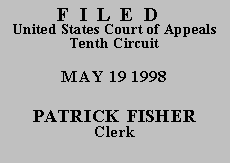

| JAMIE LOWE,
Plaintiff-Appellant, v. ANGELO'S ITALIAN FOODS, INC., Defendant-Appellee.
EQUAL EMPLOYMENT OPPORTUNITY COMMISSION, Amicus Curiae. |
|
Plaintiff Jamie Lowe appeals the district court's order dismissing her claim alleging violations of the Americans with Disabilities Act ("ADA") on the basis that plaintiff was judicially estopped from maintaining such a claim because she had successfully obtained social security disability benefits. We have jurisdiction pursuant to 28 U.S.C. § 1291 and, in accordance with our recent decision in Rascon v. U S West Communications, Inc., No. 96-2194, 1998 WL 223465 (10th Cir. May 6, 1998), we reverse.
Plaintiff began work for defendant Angelo's Italian Foods, an Italian restaurant, in August 1992. Plaintiff's duties included purchasing and inventory control for the restaurant. On October 22, 1992, plaintiff gave her supervisor a letter from her doctor stating that she was suffering from pain and weakness in her right leg and had neurological problems that caused her to fatigue easily. The doctor's note said plaintiff should be allowed to sit down occasionally, and avoid stooping, bending and carrying anything heavier than fifteen pounds. Defendant terminated plaintiff that same day. Plaintiff was later diagnosed with multiple sclerosis.
Plaintiff filed a complaint asserting ADA, Title VII and pendant state law claims. The district court granted summary judgment in favor of defendant. On appeal, we reversed the grant of summary judgment on her ADA claim, finding that plaintiff presented evidence creating a genuine issue of fact with respect to whether her ability to lift, which we held was a "major life activity," was substantially impaired. See Lowe v. Angelo's Italian Foods, Inc., 87 F.3d 1170, 1174 (10th Cir. 1996).
Five months after defendant terminated her employment, plaintiff applied for, and was awarded, social security disability benefits. The decision of the administrative law judge (ALJ) stated that plaintiff claimed to be "unable to work since October 25, 1992 as a result of numbness and weakness caused by multiple sclerosis." Appellant's Appendix, at 210. The ALJ found that plaintiff was disabled, within the meaning of the Social Security Act. Id. at 212. On remand, the defendant again moved for summary judgment on plaintiff's ADA claim, arguing that plaintiff was estopped from claiming she could perform the essential functions of her work because she received social security disability benefits based on her assertion that she was disabled as of October 25, 1992.
The district court agreed, holding that plaintiff was judicially estopped from claiming that she could perform the essential functions of her job with or without accommodation, as is required to assert a claim under the ADA, because, in order to receive social security disability benefits, she claimed that she was disabled and unable to work only three days after she sought an accommodation from defendant.
We recently reaffirmed our rejection of the doctrine of judicial estoppel and joined the majority circuits in holding that "statements made in connection with an application for social security disability benefits cannot be an automatic bar to a disability discrimination claim under the ADA." Rascon, 1998 WL 223465, at *9. We recognized that
the ADA takes into consideration whether an individual with a disability can work given reasonable accommodation. See 42 U.S.C. § 12111(8) (emphasis added). The Social Security Act, on the other hand, does not take into consideration whether an accommodation would render the individual able to perform a job. Therefore, a statement that a person is disabled for purposes of obtaining social security disability benefits--a determination made without regard to accommodation--is not necessarily inconsistent with a statement that a person has been discriminated against in the workplace on the basis of her disability--a determination made only after giving due regard to accommodation.
Id. at *7.
We concluded that statements made in connection with an application for social security disability benefits "may, however, constitute evidence relevant to a determination of whether the plaintiff is a 'qualified individual with a disability'" within the meaning of the ADA. See id. at *9.
Accordingly, the judgment of the United States District Court for the District of Kansas is REVERSED and the case is REMANDED for reconsideration in light of our decision in Rascon.
Entered for the Court
Circuit Judge
*. This order and judgment is not binding precedent, except under the doctrines of law of the case, res judicata, and collateral estoppel. The court generally disfavors the citation of orders and judgments; nevertheless, an order and judgment may be cited under the terms and conditions of 10th Cir. R. 36.3.